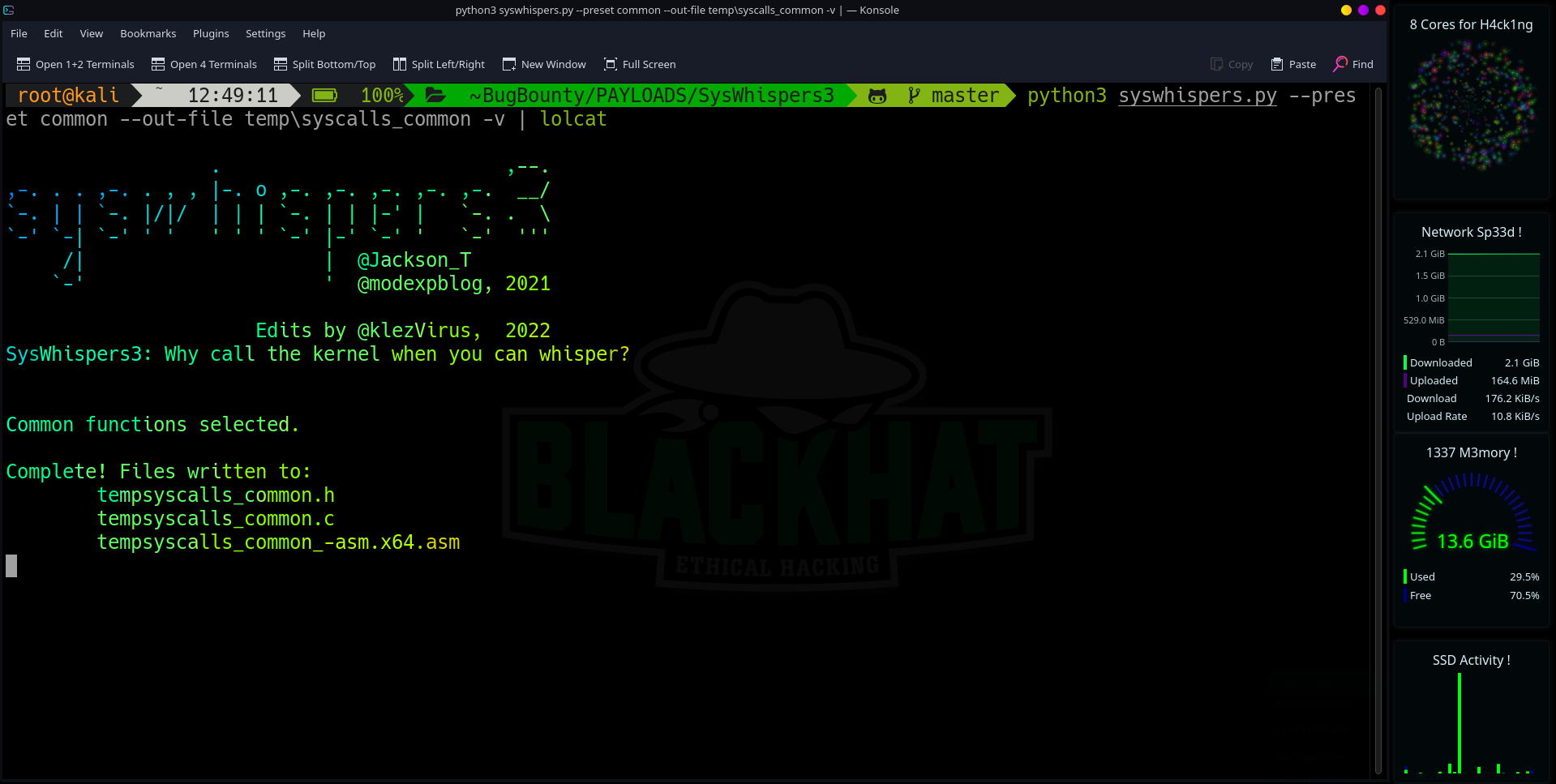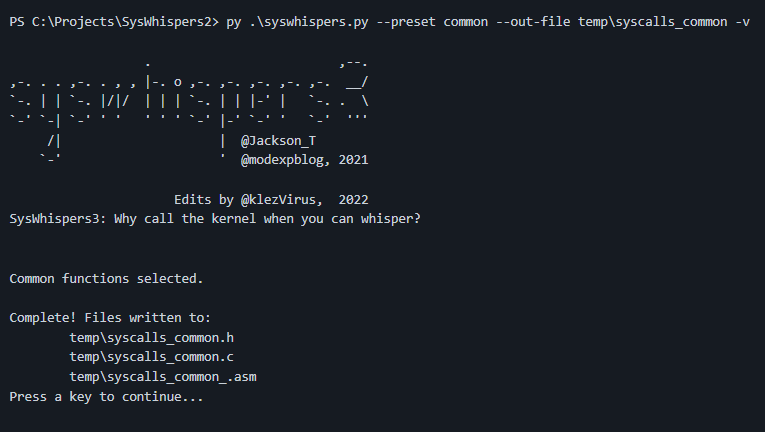Offensive Security Tool: SysWhispers3

Reading Time: 4 Minutes
Offensive Security Tool: SysWhispers3
SysWhispers3
Crafting a fully undetectable payload (FUD) in Pentesting or Bug Bounty requires some specific skill. You are trying to evade all the AVs which can be done with a certain methodology. SysWhispers by klezVirus helps with evasion by generating header/ASM files implants that can be used to make direct system calls.
Differences with SysWhispers2
The usage is pretty similar to SysWhispers2, with the following exceptions:
- It also supports x86/WoW64
- It supports syscalls instruction replacement with an EGG (to be dynamically replaced)
- It supports direct jumps to syscalls in x86/x64 mode (in WOW64 it’s almost standard)
- It supports direct jumps to random syscalls (borrowing @ElephantSeal’s idea)
A better explanation of these features are better outlined here: SysWhispers is dead, long live SysWhispers!
See Also: Complete Offensive Security and Ethical Hacking Course
Introduction
Security products, such as AVs and EDRs, usually place hooks in user-mode API functions to analyse a program execution flow, in order to detect potentially malicious activities.
SysWhispers2 is a tool designed to generate header/ASM pairs for any system call in the core kernel image (ntoskrnl.exe), which can then be integrated and called directly from C/C++ code, evading user-lands hooks.
The tool, however, generates some patters which can be included in signatures, or behaviour which can be detected at runtime.
SysWhispers3 is built on top of SysWhispers2, and integrates some helpful features to bypass these forms of detection.
Installation
C:\> git clone https://github.com/klezVirus/SysWhispers3.git
C:\> cd SysWhispers3
C:\> python .\syswhispers.py --help
Usage and Examples
The help shows all the available commands and features of the tool:
C:\>python syswhispers.py -h
usage: syswhispers.py [-h] [-p PRESET] [-a {x86,x64}] [-m {embedded,egg_hunter,jumper,jumper_randomized}] [-f FUNCTIONS] -o OUT_FILE [--int2eh] [--wow64] [-v] [-d]
SysWhispers3 - SysWhispers on steroids
optional arguments:
-h, --help show this help message and exit
-p PRESET, --preset PRESET
Preset ("all", "common")
-a {x86,x64}, --arch {x86,x64}
Architecture
-c {msvc,mingw,all}, --compiler {msvc,mingw,all}
Compiler
-m {embedded,egg_hunter,jumper,jumper_randomized}, --method {embedded,egg_hunter,jumper,jumper_randomized}
Syscall recovery method
-f FUNCTIONS, --functions FUNCTIONS
Comma-separated functions
-o OUT_FILE, --out-file OUT_FILE
Output basename (w/o extension)
--int2eh Use the old `int 2eh` instruction in place of `syscall`
--wow64 Use Wow64 to run x86 on x64 (only usable with x86 architecture)
-v, --verbose Enable debug output
-d, --debug Enable syscall debug (insert software breakpoint)
Command Lines
Standard SysWhispers, embedded system calls (x64)
# Export all functions with compatibility for all supported Windows versions (see example-output/).
py .\syswhispers.py --preset all -o syscalls_all
# Export just the common functions (see below for list).
py .\syswhispers.py --preset common -o syscalls_common
# Export NtProtectVirtualMemory and NtWriteVirtualMemory with compatibility for all versions.
py .\syswhispers.py --functions NtProtectVirtualMemory,NtWriteVirtualMemory -o syscalls_mem
SysWhispers3-only samples
# Normal SysWhispers, 32-bits mode
py .\syswhispers.py --preset all -o syscalls_all -m jumper --arch x86
# Normal SysWhispers, using WOW64 in 32-bits mode (only specific functions)
py .\syswhispers.py --functions NtProtectVirtualMemory,NtWriteVirtualMemory -o syscalls_mem --arch x86 --wow64
# Egg-Hunting SysWhispers, to bypass the "mark of the sycall" (common function)
py .\syswhispers.py --preset common -o syscalls_common -m jumper
# Jumping/Jumping Randomized SysWhispers, to bypass dynamic RIP validation (all functions) using MinGW as the compiler
py .\syswhispers.py --preset all -o syscalls_all -m jumper -c mingw
Script Output
See Also: Offensive Security Tool: Scapy
Importing into Visual Studio
- Copy the generated H/C/ASM files into the project folder.
- In Visual Studio, go to Project → Build Customizations… and enable MASM.
- In the Solution Explorer, add the .h and .c/.asm files to the project as header and source files, respectively.
- Go to the properties of the ASM file, and set the Item Type to Microsoft Macro Assembler.
Compiling outside of Visual Studio
Windows
Makefile for 64 bits:
Makefile.msvc
OPTIONS = -Zp8 -c -nologo -Gy -Os -O1 -GR- -EHa -Oi -GS-
LIBS = libvcruntime.lib libcmt.lib ucrt.lib kernel32.lib
program:
ML64 /c syscalls-asm.x64.asm /link /NODEFAULTLIB /RELEASE /MACHINE:X64
cl.exe $(OPTIONS) syscalls.c program.c
link.exe /OUT:program.x64.exe -nologo $(LIBS) /MACHINE:X64 -subsystem:console -nodefaultlib syscalls-asm.x64.obj syscalls.obj program.objMakefile for 32 bits:
Makefile.msvc
OPTIONS = -Zp8 -c -nologo -Gy -Os -O1 -GR- -EHa -Oi -GS-
LIBS = libvcruntime.lib libcmt.lib ucrt.lib kernel32.lib
program:
ML /c syscalls-asm.x86.asm /link /NODEFAULTLIB /RELEASE /MACHINE:X86
cl.exe $(OPTIONS) syscalls.c program.c
link.exe /OUT:program.x86.exe -nologo $(LIBS) /MACHINE:X86 -subsystem:console -nodefaultlib syscalls-asm.x86.obj syscalls.obj program.objCompile with nmake:
nmake -f Makefile.msvc
Linux
Makefile for both 64 and 32 bits:
Makefile.mingw
CC_x64 := x86_64-w64-mingw32-gcc
CC_x86 := i686-w64-mingw32-gcc
OPTIONS := -masm=intel -Wall
program:
$(CC_x64) syscalls.c program.c -o program.x64.exe $(OPTIONS)
$(CC_x86) syscalls.c program.c -o program.x86.exe $(OPTIONS)
Compile with make:
make -f Makefile.mingw
Caveats and Limitations
- The Egg-Hunter functionality is not implemented within this tool, it is in Inceptor.
- System calls from the graphical subsystem (win32k.sys) are not supported.
- Tested on Visual Studio 2019/2022 with Windows 10 SDK.
- Support for NASM is not guaranteed.
- Support for GCC and MinGW is not guaranteed.
Troubleshooting
From SysWhispers2
- Type redefinitions errors: a project may not compile if typedefs in syscalls.h have already been defined.
⦿ Ensure that only required functions are included (i.e. –preset all is rarely necessary).
⦿ If a typedef is already defined in another used header, then it could be removed from syscalls.h.
New
- With –verbose, it is possible to enable troubleshooting output during code generation.
- With –debug, the tool will insert a software breakpoint in the syscall stub, to ease the debugging in WinDbg.
- If you get a error A2084:constant value too large during compilation, regenerates the stubs.
See Also: Hacking stories: MafiaBoy, the hacker who took down the Internet










